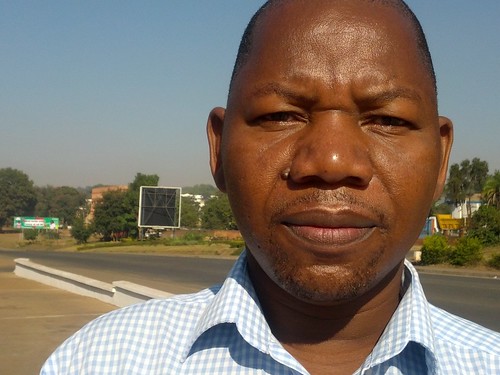RISING voices: Regis Chikowo, Africa RISING Malawi coordinator and MSU research associate
In this interview, Regis Chikowo introduces himself and his work with Africa RISING. It is one of a series of portraits of key people in the program.

Tell us about your background
I’m trained as a soil scientist / agronomist. I studied for my PhD in the Plant Production Systems group at Wageningen University, 10 years ago. I’ve enjoyed looking at cropping systems and nutrient cycling, which has made my association with Africa RISING very natural. We try to find entry points that will appeal to farmers. Grain legumes are very important to farmers, especially women farmers. So one would want to situate production of grain legumes in the sustainable intensification discourse – how to use grain legumes to intensify systems knowing so well that these grain legumes can potentially be net nitrogen exporters as breeders concentrate on high protein off-take through grain? I try to use basic science to make farming systems work better, putting what we have learned over the years at plot level to answer farm scale problems. Appropriate nutrient cycling is key as most soils in Africa are inherently infertile or they have been run down over the years due to extractive farming practices. I am now a research associate at Michigan State University and have been involved in Africa RISING since May 2012.
What do you do in your current position?
I basically coordinate Africa RISING activities in Malawi. It gives me very nice opportunities to work with a lot of partners – Africa RISING is based on partnerships. In Malawi we have CIAT, ICRAF, Bunda College (now called LUANAR – Lilongwe University of Agriculture and Natural Resources). I also work with local partners in Dedza and Ntcheu districts, our Africa RISING intervention districts. The District Agricultural Development Officers (DADOs) are the convenors of our district-anchored R4D (research for development) platforms. They connect all the important players in the agricultural sector at district level. Within LUANAR we work with 3 departments (Agronomy, Animal Science, Food Science and Nutrition). We have now managed to work together as a team in our common intervention sites, and it is very encouraging to have a team that focuses on our Africa RISING goals, despite the scientists coming from different institutions. Working in this way, you begin to appreciate how important other disciplines are and we develop a common understanding on how to move forward with different entry points.
What are your plans for Africa RISING?
We managed to establish four action sites. Each of the action sites has thousands f farmers, so we can be sure that our technologies will reach a lot of farmers. Now our next step is to expand the group of farmers that will be directly experimenting with SI technologies. Last year they were 450 doing baby trials; this year we have doubled this to 1008. If each baby trial influences 10 farmers around, this approach starts affecting thousands of households so there’s an inherent multiplier effect. Not every farmer can experiment on their fields but this mother-baby trial approach helps farmers get more confident about applying technologies. As a research program, we want to understand how our technologies work at plot scale as well as farm scales. We progressively move from plot to farm to community scale. When IFPRI comes to evaluate we hope it will be clear evidence of the impact of the project.
What are the biggest Africa RISING challenges and how do we deal with them?
Africa RISING is a research program. Once we start working with 1000’s of farmers, it becomes difficult for a researcher to manage this process because we work with research budgets, not large development budgets and we have to know our limits, as we cannot go on indefinitely increasing the numbers. We need to keep the focus on research pathways: we are producing research pathways and models that can be used by development partners to reach out to tens of thousands of farmers, including poor farmers that cannot easily be reached. We talk a lot about USAID missions, NGOs etc.: our role is to get the strategies to other partners. I have noticed that dealing with 1000 farmers (which have to be trained) is straining our research assistants etc.




